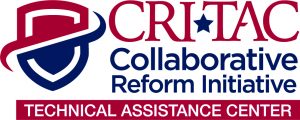Every day, law enforcement agencies and the communities they serve face challenges. Some agencies struggle to meet drastically changing service demands, while others are unsure about how to allocate resources, incorporate promising practices, or spread the word about new programs. Some agencies are looking for new and effective ways to engage their communities. If you are a law enforcement executive looking for support, the Collaborative Reform Initiative Technical Assistance Center (CRI-TAC) is here to help.
Funded by the U.S. Department of Justice, Office of Community Oriented Policing Services (COPS Office), the CRI-TAC offers no-cost, customized solutions to law enforcement agencies throughout the United States. The solutions provided are tailored to the specific agency and informed by cutting-edge innovation and evidence-based and promising practices.
Services
The CRI-TAC offers a number of technical assistance services, delivered by subject matter experts from the field, including the following:
- Resource Referral—toolkits, reports, and other relevant publications
- Web-based Training—recorded webinars and live online training
- In-person Training—existing and customized on-site training
- Virtual Mentoring—connections to subject matter experts to share information and promising practices via phone or video conference call
- Meeting Facilitation—assistance in facilitating meetings among agency members and other public and private sector stakeholders
- On-site Consultation—visits to the requesting agency to collaborate with agency leaders and provide guidance on best practices and tailored solutions
Topic Areas
Law enforcement agencies must be prepared to respond to a broad range of diverse issues. Because of this, the CRI-TAC has the ability to address more than 20 critical law enforcement areas, including the following topics:
- Modern Police Performance Management (e.g., CompStat)
- Crime Analysis
- Active Shooter Response
- Prosecution Coordination and Partnerships
- Public Sector Coordination and Partnerships
- Private Sector Coordination and Partnerships
- Tribal Law Enforcement
- Intelligence and Information Sharing
- Focused Deterrence
- Gun Violence Reduction and Prevention
- Problem-solving Techniques
- Proactive Policing
- Mass Casualty Response
- Officer Safety and Wellness
- Mass Demonstration Response
- Gangs
- Violent Crime Reduction and Prevention
- Drug-related Crime
- Shared Service Models
- Community Engagement
- De-escalation
- Crisis Intervention
- At-risk Youth
- Domestic Violence Reduction and Prevention
- Human Trafficking
- School Safety
- Traffic Safety
Subject Matter Expertise
The CRI-TAC pulls from the reach and expertise of the IACP and eight partner organizations—Fraternal Order of Police, Major Cities Chiefs Association, Federal Bureau of Investigation National Academy Associates, International Association of Campus Law Enforcement Administrators, International Association of Directors of Law Enforcement Standards and Training, National Association of Women Law Enforcement Executives, National Organization of Black Law Enforcement Executives, and National Tactical Officers Association. With more than 420,000 combined members, these partners provide reports, toolkits, and online and in-person training. In addition, the partners pull from the vast knowledge of their organizational staff and membership to deliver subject matter expertise, providing virtual and on-site consultation by the field, for the field.
Requesting Assistance
To request assistance, visit www.CollaborativeReform.org or email CRITAC@theIACP.org. Submitting a request is as simple as clicking a button, which will open an email to the CRI-TAC staff. In your email, we ask that you include some brief information about your agency, including the number of sworn officers and population served. All requests must be received from the chief executive of the agency or with expressed authorization from the chief executive.
The Technical Assistance Process
When a law enforcement agency makes a request, the CRI-TAC staff works directly with the agency to understand its particular needs and collaboratively develop a technical assistance plan. This process has three main phases:
1. Intake. During the intake phase, CRI-TAC staff and subject matter experts from the IACP and partner organizations will contact the requesting agency to discuss its needs and how they can be addressed via technical assistance. CRI-TAC staff will then develop a formal request document with input from the requesting agency.
2. Work Plan. Once the request has been finalized, CRI-TAC staff will develop a detailed work plan that includes specific subject matter experts, details about the resources and services to be delivered, and timelines. This will also be sent to the requesting agency for review, comment, and modification before the chief executive of the agency approves and signs off on the plan.
3. Delivery. After the work plan has been finalized, CRI-TAC staff will set up a kick-off meeting with the requesting agency, CRI-TAC staff, and the subject matter experts that will be involved in the technical assistance delivery. From there, work will commence in accordance with the work plan and in close collaboration with the agency.

Throughout the process, CRI-TAC staff will stay in contact with the agency to ensure its needs and expectations are being met.
|
This project was supported, in whole or in part, by Cooperative Agreement Number 2017‐CR‐WX‐K001 awarded by the U.S. Department of Justice, Office of Community Oriented Policing Services. The opinions contained herein are those of the author(s) or contributor(s) and do not necessarily represent the official position or policies of the U.S. Department of Justice. References to specific individuals, agencies, companies, products, or services should not be considered an endorsement by the author(s) or the U.S. Department of Justice. Rather, the references are illustrations to supplement discussion of the issues. The Internet references cited in this publication were valid as of the date of publication. Given that URLs and websites are in constant flux, neither the author(s) nor the COPS Office can vouch for their current validity. |



